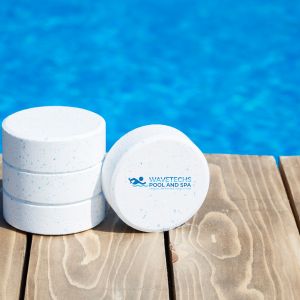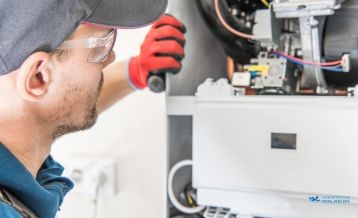
Maintaining a backyard swimming pool is a task that requires attention to detail and the right equipment. Central to this maintenance is the regulation of chlorine levels. Chlorine is essential for keeping swimming pools safe by killing bacteria and other harmful organisms. Hence, it's no surprise that pool service companies prioritize how chlorine is distributed into the pool. Explore the difference between a pool salt water system and traditional chlorine, exploring their differences, advantages, and considerations for pool filter installation.
Pool Salt Water System vs. Traditional Chlorine
 Pool salt water systems have gained popularity in more recent years for their convenience and potential benefits over traditional chlorine methods. While both systems ultimately rely on chlorine for sanitizing, the mechanisms on how they do this differ significantly. Traditional chlorine pools require manual addition of chlorine chemicals to maintain adequate levels. To ensure chlorine is at the required levels, many pool owners differ from trusted pool service companies. On the other hand, salt water systems use a process called electrolysis, where dissolved salt in the water generates chlorine through an electrically charged cell and disperses it throughout the pull water. In both cases, the pool pump helps circulated chlorinated water to ensure the entire swimming pool is sanitized and healthy.
Pool salt water systems have gained popularity in more recent years for their convenience and potential benefits over traditional chlorine methods. While both systems ultimately rely on chlorine for sanitizing, the mechanisms on how they do this differ significantly. Traditional chlorine pools require manual addition of chlorine chemicals to maintain adequate levels. To ensure chlorine is at the required levels, many pool owners differ from trusted pool service companies. On the other hand, salt water systems use a process called electrolysis, where dissolved salt in the water generates chlorine through an electrically charged cell and disperses it throughout the pull water. In both cases, the pool pump helps circulated chlorinated water to ensure the entire swimming pool is sanitized and healthy.
Advantages of Pool Salt Water Systems
One of the primary advantages of pool salt water systems is the convenience they offer. Once a pool salt water system is installed, chlorine production is automated, reducing the need for frequent manual chemical additions. Additionally, salt water pools are often perceived as gentler on the skin and eyes compared to traditional chlorine pools, making them more comfortable for swimmers.
However, it's crucial to note that pool salt water systems require an initial investment for installation and may entail higher upfront costs compared to traditional chlorine methods. Moreover, they still require proper pool maintenance, including monitoring salt levels and occasional cell cleaning to ensure optimal performance.
The Impact on Pool Filter Installation
Effective chlorine upkeep directly influences the longevity and efficiency of pool filters. Poor chlorine maintenance can result in imbalanced water chemistry, leading to the accumulation of contaminants and algae growth, ultimately causing the pool filter to work harder. Clogged or inefficient filters can impair water circulation and filtration, compromising water quality and necessitating premature replacement.
Pool owners should consider the compatibility of their chosen sanitization method with their filtration system during pool filter installation. While both salt water systems and traditional chlorine can work with various filter types, ensuring proper maintenance and balance is essential to prevent unnecessary strain on the filtration system.
Why Trust Wavetechs Pool and Spa for Your Pool Services
When it comes to pool filter installation and salt water system installation or replacement, trust is of the utmost importance. Wavetechs Pool and Spa stand out as a reliable choice for those seeking expert pool services in For Worth and Dallas . With a proven track record of excellence and dedication to customer satisfaction, the Wavetechs Pool and Spa team ensures professional installation and maintenance of pool filtration systems and salt water systems.
The decision between a pool salt water system and traditional chlorine depends on various factors, including convenience, upfront costs, and maintenance requirements. Regardless of the choice, proper pool filter installation and maintenance are crucial for ensuring clean and safe swimming conditions. For unparalleled expertise and service, pool owners can confidently rely on Wavetechs Pool and Spa for their pool filtration and salt water system needs.










